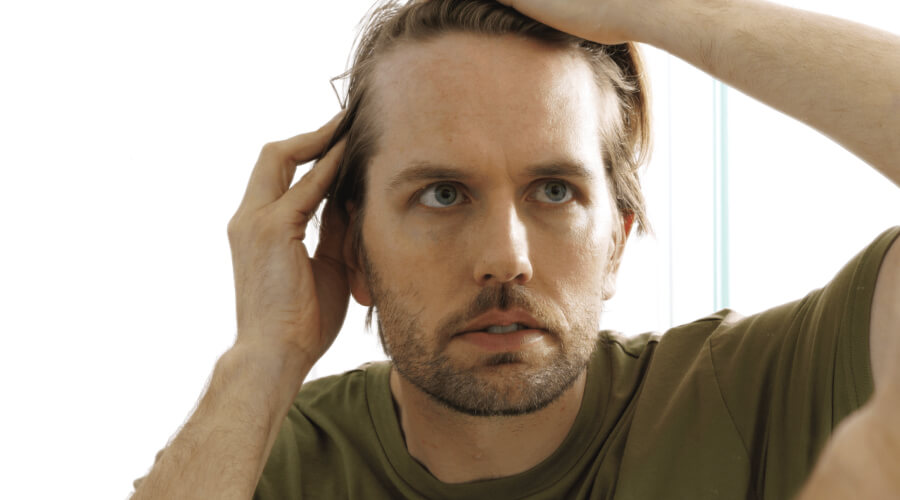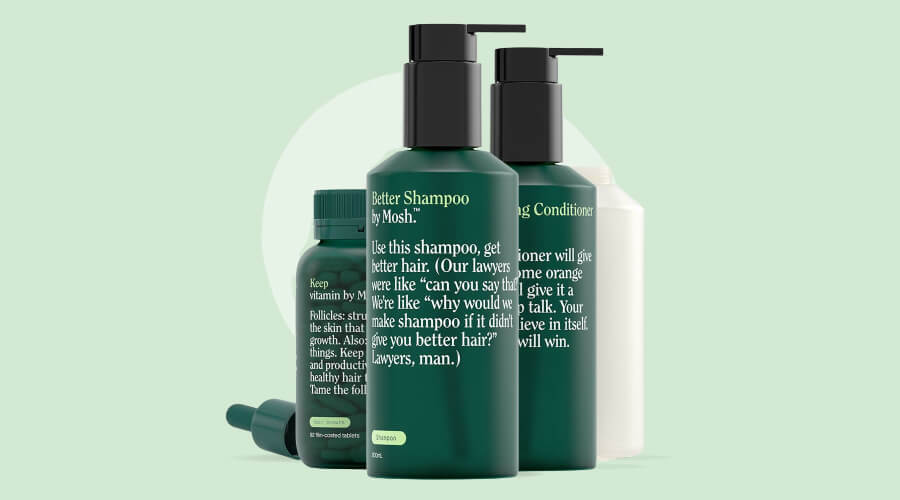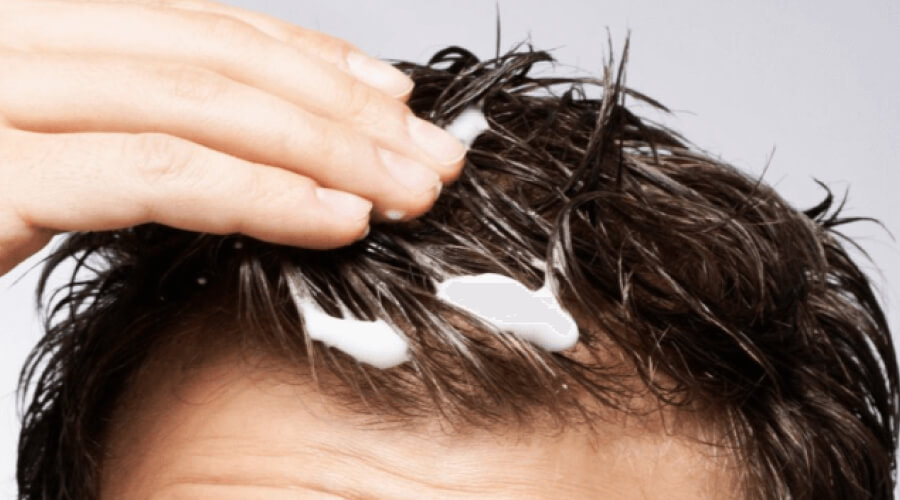Have you noticed a bald spot on your head that just seems to be getting bigger and bigger? Well, don’t worry, male hair loss is incredibly common!
We don’t want you to suffer in silence, so today we’re going to dive deep into male pattern baldness, that notorious culprit behind receding hairlines and thinning crowns.
We’ll uncover the underlying causes of hair loss, demystify the various types of hair loss men commonly experience, and shed light on the role of genetics, hormones (particularly the mischievous DHT), and medical conditions like thyroid disorders.
And of course, we’ll also be covering the best hair loss treatment options available. From easily accessible over-the-counter solutions like topical minoxidil to doctor-prescribed hair loss pills, to supplements, and more.
So, let’s get cracking with the best hair loss treatments for men in Australia. By the time we’re done, you’ll be armed with the knowledge to make informed decisions and embrace the path to hair regrowth and prevention of further loss.
Understanding Different Forms of Hair Loss

When it comes to hair loss, men can face a few familiar foes. Let’s take a quick tour of the common culprits:
- Androgenetic Alopecia: The notorious male pattern baldness takes centre stage, causing gradual hair thinning and receding hairlines. It’s the most common type of hair loss in men.
- Alopecia Areata: This condition leads to patchy hair loss, often appearing in small, round bald patches on the scalp.
- Telogen Effluvium: Sometimes triggered by physical or emotional stress, this temporary hair loss condition results in excessive shedding.
Influencing Factors
Now, let’s unveil the factors that play a role in hair thinning and loss among men:
- Genetics: Thanks to the DNA handed down by our ancestors, some of us are more predisposed to hair loss than others. Blame it on the genes!
- Hormones and DHT: Enter the villainous hormone known as dihydrotestosterone (DHT). It wreaks havoc on hair follicles, leading to their shrinkage and eventual demise.
- Medical Conditions: Certain health issues, like thyroid disorders, can throw our hair growth cycles off balance, contributing to hair loss.
Now that we’ve uncovered the secrets behind hair loss, let’s move on to the exciting part—finding ways to tackle it head-on!
Hair Loss Pills: Minoxidil and Finasteride
When it comes to FDA-approved treatments for male pattern hair loss, two prominent players take the stage: minoxidil (Rogaine) and finasteride (Propecia). Let’s delve into their effectiveness, role in promoting hair regrowth, and potential side effects.
- Minoxidil (Rogaine): Minoxidil is a topical medication available over the counter. Here’s what you need to know:
Effectiveness: Minoxidil has shown promising results in promoting hair regrowth, especially in the crown area. It works by revitalising hair follicles, extending their growth phase, and stimulating new hair production.
Role in Hair Regrowth: Minoxidil’s magic lies in its ability to improve blood flow to the hair follicles, which enhances their nutrient supply and encourages thicker, healthier hair growth.
Potential Side Effects: While generally well-tolerated, some users may experience scalp irritation, dryness, or temporary shedding during the initial phase of treatment. These effects are typically mild and subside over time.
- Finasteride (Propecia): Finasteride is an oral medication available by prescription. Let’s explore its impact on hair regrowth:
Effectiveness: Finasteride has demonstrated significant effectiveness in slowing down hair loss and promoting hair regrowth, particularly at the crown and top of the head. It works by reducing the levels of DHT, the hormone responsible for shrinking hair follicles in male pattern baldness.
Role in Hair Regrowth: By inhibiting the production of DHT, finasteride helps to preserve existing hair follicles and stimulate the regrowth of miniaturised hairs, leading to improved hair density and thickness.
Potential Side Effects: While rare, some users may experience side effects such as decreased libido, erectile dysfunction, or breast tenderness. It’s important to consult a healthcare professional to discuss potential risks and benefits before starting finasteride.
Remember, both minoxidil and finasteride require consistent use to maintain their benefits. It’s essential to consult with a healthcare professional to determine the most suitable option based on your individual needs and medical history.
Where to Buy Hair Loss Tablets in Australia

As minoxidil was originally developed as an antihypertensive medication, it requires a prescription from a healthcare professional.
If you are considering oral minoxidil for hair loss or beard growth, it is crucial to consult with a prescribing physician who can evaluate your specific needs and provide guidance on the best course of action.
To obtain oral minoxidil in Australia, schedule an appointment with a healthcare professional, such as a dermatologist or general practitioner.
They will assess your hair loss condition and determine if oral minoxidil is a suitable option for you.
You can also access hair loss tablets via online health platforms such as:
Other Treatment Options: Topical Treatments, Laser Therapy, and Hair Transplant Surgery
In addition to hair loss pills, there are other effective treatment options worth exploring. Let’s take a closer look at topical treatments, low-level laser therapy, and hair transplant surgery, including their processes, advantages, and limitations.
- Topical Treatments (e.g., Rogaine (minoxidil)): Topical treatments like Rogaine are applied directly to the scalp. Here’s what you should know:
Process: These treatments are typically available as foams, solutions, or sprays. They are applied directly to the scalp, and the active ingredients work to promote hair growth by revitalising hair follicles and extending the growth phase.
Advantages: Topical treatments are convenient and can be easily incorporated into your daily routine. They have shown effectiveness in promoting hair regrowth, particularly in the crown area.
Limitations: The effectiveness may vary from person to person, and results may take several months to become noticeable. Consistency in application is key to maintaining the benefits.
- Low-Level Laser Therapy: Low-level laser therapy utilises specialised light to stimulate hair follicles. Let’s shed some light on this treatment:
Process: Devices emitting low-level laser light are either used at home or administered in a clinical setting. The light penetrates the scalp, stimulating hair follicles and promoting regrowth.
Advantages: Low-level laser therapy is non-invasive and painless. It can be used in conjunction with other treatments and may help improve hair density and thickness.
Limitations: Results may vary, and it may take several months of consistent use to see noticeable improvements. Low-level laser therapy may be more effective for individuals in the early stages of hair loss.
- Hair Transplant Surgery: Hair transplant surgery involves relocating healthy hair follicles to areas experiencing hair loss. Let’s explore this surgical option:
Process: Hair transplant surgery is a precise procedure performed by a qualified surgeon. Healthy hair follicles are harvested from donor areas and transplanted to the balding or thinning areas of the scalp.
Advantages: Hair transplant surgery offers a permanent solution with natural-looking results. It can restore hair density and improve overall appearance and self-confidence.
Limitations: Hair transplant surgery is a surgical procedure that requires careful consideration. It can be costly and may require multiple sessions. It’s essential to consult with a skilled surgeon to determine candidacy and manage expectations.
Supplements for Hair Growth: Biotin, Saw Palmetto, and Nutrafol
When it comes to promoting hair regrowth and maintaining healthy hair, natural supplements have gained popularity. Let’s explore the potential benefits of three popular supplements: biotin, saw palmetto, and Nutrafol.
- Biotin: Biotin, also known as vitamin B7, is a water-soluble vitamin that plays a crucial role in maintaining healthy hair, skin, and nails.
Potential Benefits: Biotin supplements are believed to support hair growth and strength. They may help improve the infrastructure of keratin, a protein that forms the structure of hair strands, making them more resilient and less prone to breakage.
Considerations: While biotin deficiency can contribute to hair loss, it’s important to note that severe deficiencies are relatively rare. Consult with a healthcare professional to determine if biotin supplementation is appropriate for your specific needs.
- Saw Palmetto: Saw palmetto is a natural extract derived from the berries of the Serenoa repens plant. It has been traditionally used to support prostate health and may have potential benefits for hair loss.
Potential Benefits: Saw palmetto is thought to inhibit the conversion of testosterone to dihydrotestosterone (DHT), the hormone associated with hair follicle shrinkage in male pattern baldness. By reducing DHT levels, saw palmetto may help slow down hair loss and promote hair regrowth.
Considerations: Research on the effectiveness of saw palmetto for hair loss is still ongoing, and individual responses may vary. It’s advisable to consult with a healthcare professional before starting any new supplement.
- Nutrafol: Nutrafol is a hair wellness supplement that combines various ingredients, including vitamins, minerals, antioxidants, and plant extracts, to support hair health.
Potential Benefits: Nutrafol claims to address multiple factors that contribute to hair loss, such as oxidative stress, inflammation, and hormonal imbalances. It aims to promote hair growth, improve hair thickness, and maintain overall hair health.
Considerations: While Nutrafol has gained popularity and positive user feedback, it’s important to note that individual results may vary. As with any supplement, it’s recommended to consult with a healthcare professional to determine if Nutrafol is suitable for you.
Supplements can be a complementary approach to hair care, but it’s essential to remember that results may take time and individual responses can vary. It’s always advisable to consult with a healthcare professional or a dermatologist before starting any new supplement regimen to ensure it aligns with your specific needs and health conditions.
Hair Growth and Hair Regrowth
Ever wondered how those magical hair growth products work their wonders? Let’s unravel their secrets:
- Improved Blood Flow: These products boost blood circulation to the hair follicles, nourishing them with essential nutrients and oxygen. It’s like a rejuvenating spa day for your hair roots!
- Reducing Hair Shaft Breakage: By strengthening the hair shaft, these products minimise breakage, preventing further loss and promoting healthier, more resilient hair.
Preventative Measures and Hair Care

To safeguard your precious locks and prevent further hair loss, incorporating preventative measures and adopting a hair-friendly care routine are crucial. Let’s explore some effective strategies:
- Managing High Blood Pressure: Believe it or not, managing high blood pressure can contribute to maintaining a healthy head of hair. High blood pressure can restrict blood flow to the scalp, potentially impacting hair follicle health. By managing blood pressure through lifestyle modifications or medication, you can promote optimal blood circulation to the scalp and support hair growth.
- Maintaining a Healthy Immune System: A robust immune system plays a role in hair health. Certain autoimmune conditions can lead to hair loss, so it’s essential to nurture your immune system through a balanced diet, regular exercise, adequate sleep, stress management, and avoiding harmful habits like smoking.
- Opting for Hair-Friendly Hairstyles: Choosing hairstyles that minimise tension and pulling on the hair can help prevent breakage and hair loss. Avoid tight hairstyles, excessive heat styling, and harsh chemical treatments that can weaken the hair shaft. Embrace looser styles, protective hairstyles, and give your hair breaks from styling to reduce damage.
- Good Hair Care Routines: Establishing a consistent hair care routine is key to maintaining healthy hair. Here are some essential tips:
- Gentle Cleansing: Use a mild shampoo suitable for your hair type to cleanse the scalp and remove buildup, without stripping away natural oils excessively.
- Conditioning: Regularly condition your hair to replenish moisture, improve manageability, and prevent breakage. Consider deep conditioning treatments or hair masks for added nourishment.
- Scalp Care: Pay attention to your scalp health. Keep it clean and free from excess oil or product buildup, as a healthy scalp provides a conducive environment for hair growth.
- Avoid Over Brushing: Brushing your hair gently and avoiding excessive pulling can prevent unnecessary hair breakage. Use a wide-toothed comb or a brush with soft bristles for detangling.
- Natural Ingredients for Healthy Hair: Explore the benefits of natural ingredients that promote hair health. Some examples include:
- Aloe Vera: Soothes the scalp, reduces inflammation, and promotes a healthy environment for hair growth.
- Coconut Oil: Nourishes and moisturises the hair, reducing protein loss and enhancing hair strength and shine.
- Argan Oil: Helps to moisturise and protect hair from damage caused by heat and styling.
- Rosemary Oil: May stimulate hair growth and improve scalp circulation when applied topically.
The Importance of Dermatology in Hair Loss
When it comes to hair loss, dermatologists play a pivotal role in diagnosing the causes and recommending appropriate treatment options. Let’s explore why their expertise is crucial and delve into how they evaluate your scalp and hair health.
- Diagnosing Hair Loss: Dermatologists are highly skilled in identifying the underlying causes of hair loss. Through a thorough examination, they can determine if the hair loss is due to male pattern baldness, alopecia areata, telogen effluvium, or other factors. Their expertise allows for accurate diagnosis, which is essential for devising the most effective treatment plan.
- Understanding Hair Density and Follicles: Dermatologists are experts in assessing hair density and evaluating the condition of hair follicles. They can determine if the hair follicles are miniaturised, which is often seen in male pattern baldness. By understanding the status of hair density and follicles, dermatologists can provide insights into the severity of hair loss and the potential for regrowth.
- Scalp and Hair Health Evaluation: Dermatologists examine your scalp and hair health to gather valuable information. They assess the scalp for signs of inflammation, infections, or any other conditions that might contribute to hair loss. They also evaluate the overall health of your hair, looking for signs of breakage, brittleness, or other issues that may require attention.
- Recommending Treatment Options: Based on their diagnosis and evaluation, dermatologists can recommend the most suitable treatment options. Whether it’s prescribing FDA-approved medications like minoxidil or finasteride, suggesting topical treatments or laser therapy, or even discussing hair transplant surgery, dermatologists provide expert guidance tailored to your specific needs.
- Holistic Approach: Dermatologists take a comprehensive approach to hair loss, considering both the medical and cosmetic aspects. They address any underlying medical conditions that may contribute to hair loss and incorporate treatments that promote hair regrowth while considering your overall well-being and desired outcomes.
The expertise of dermatologists in hair loss is invaluable. They bring a deep understanding of hair biology, scalp health, and the intricacies of various hair loss conditions. By consulting a dermatologist, you can benefit from their knowledge, experience, and tailored treatment plans to address your specific concerns and restore the health and vitality of your hair.
Androgenic alopecia, also known as male pattern baldness, is the most common type of hair loss.
Medical treatments for hair loss encompass a range of options, such as FDA-approved medications like minoxidil (Rogaine) and finasteride (Propecia), as well as advanced procedures like platelet-rich plasma (PRP) therapy and hair transplant surgery.
You can explore a wide range of hair loss treatments, including reputable brands and products, on platforms like Amazon, Mosh, Pilot and more e-commerce platforms.
While dandruff itself may not directly cause hair loss, persistent scalp conditions like dandruff can contribute to scalp inflammation, which may impact hair health. Treating dandruff with appropriate anti-dandruff shampoos or consulting a dermatologist can help maintain a healthy scalp environment.
The active ingredient in Rogaine is minoxidil.
Yes, hair restoration procedures like hair transplant surgery can help restore lost hair by transplanting healthy hair follicles from donor areas to the balding or thinning areas. However, the suitability and success of the procedure depend on various factors, which should be assessed by a qualified professional.
Scalp massage can help improve blood circulation, reduce stress, and promote relaxation, which may indirectly benefit hair health. While it may not be a standalone solution for hair loss, incorporating scalp massage into your hair care routine can contribute to overall scalp and hair well-being.
So, what’s the best hair loss treatment for men? Well, it all comes down to your personal needs and we recommend consulting with a dermatologist to help find the right solution for you.
Now, if you know what you need and you’re ready to embark on your journey towards a fuller head of hair, we’ve got you covered! Finding reliable and high-quality minoxidil products is essential for achieving your desired hair transformation.
Check out our handpicked list of reputable minoxidil retailers where you can shop with confidence and take that exciting step towards your dream hair.